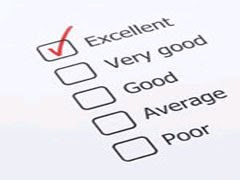
By : RO
Although you are working in teams, sometimes there is work to be executed by themselves without the intervention of co-workers. The results of your work will typically require input from colleagues or superiors to determine what needs to be corrected errors or deficiencies that must be added. Obviously not all the input from team members will follow, because, as the executor of the job, you are most know where the criticism or advice that can be applied.
Sometimes there are team members who deliver unpleasant comment. There was a negative, so you take it as criticism. Any form of criticism, either build or drop, requiring special skills and ways that you can still see it as an input that can give contributions to both the results of your work.
Here is how to wisely deal with criticism about your work.
1. Accept the fact that you are not perfect.
Mistakes are common to happen. Prepare yourself that coworkers will provide criticism of your work. All you need do is to minimize errors in your work and to anticipate every error.
2. Anticipation of any criticism by asking yourself, what can I learn from this criticism?
What can I learn from the criticism of my work? Every time your blood starts to boil because coworkers scathing criticism, ask yourself this question.
3. Consider carefully critique.
This is to avoid the same mistakes in future. Record their input and fix these errors. Do not think that prices will fall because you admit your mistakes, but ought to remember that the most important thing is to give the best for the company.
4. Do not take it personally and be positive.
Crimination colleagues on the results of your work does not mean that he does not like you personally, or think you are not competent to do your job. You just want your colleagues to do the best and keep improving your work performance. Remember that the criticism was the work not you personally.
5. Do not just focus on the negative criticism.
People have a tendency to only hear negative things and not ignore the positive things that actually can be drawn from such criticism. Open your mind and find something positive from every criticism of colleagues or superiors.
6. Analysis of any criticism that comes.
You need time to process every criticism. The decision is yours, whether you accept criticism and improve your work or even not doing anything. However, if the same criticism often sounded start, pay attention. There is a possibility that your work is not good enough. If so, correct the way we work.
7. Ignore if the criticism is not constructive.
If you accept the criticism that does not build even tend to drop, there is no better way than to ignore it. Criticism will be hurt not build your confidence which in turn will affect your performance and productivity as employees. How do example of destructive criticism? Use words like stupid, stupid, or words that can undermine self-confidence is a worthy example of the criticism is ignored. Generally this kind of criticism will not improve your performance as an employee.
Sometimes there are team members who deliver unpleasant comment. There was a negative, so you take it as criticism. Any form of criticism, either build or drop, requiring special skills and ways that you can still see it as an input that can give contributions to both the results of your work.
Here is how to wisely deal with criticism about your work.
1. Accept the fact that you are not perfect.
Mistakes are common to happen. Prepare yourself that coworkers will provide criticism of your work. All you need do is to minimize errors in your work and to anticipate every error.
2. Anticipation of any criticism by asking yourself, what can I learn from this criticism?
What can I learn from the criticism of my work? Every time your blood starts to boil because coworkers scathing criticism, ask yourself this question.
3. Consider carefully critique.
This is to avoid the same mistakes in future. Record their input and fix these errors. Do not think that prices will fall because you admit your mistakes, but ought to remember that the most important thing is to give the best for the company.
4. Do not take it personally and be positive.
Crimination colleagues on the results of your work does not mean that he does not like you personally, or think you are not competent to do your job. You just want your colleagues to do the best and keep improving your work performance. Remember that the criticism was the work not you personally.
5. Do not just focus on the negative criticism.
People have a tendency to only hear negative things and not ignore the positive things that actually can be drawn from such criticism. Open your mind and find something positive from every criticism of colleagues or superiors.
6. Analysis of any criticism that comes.
You need time to process every criticism. The decision is yours, whether you accept criticism and improve your work or even not doing anything. However, if the same criticism often sounded start, pay attention. There is a possibility that your work is not good enough. If so, correct the way we work.
7. Ignore if the criticism is not constructive.
If you accept the criticism that does not build even tend to drop, there is no better way than to ignore it. Criticism will be hurt not build your confidence which in turn will affect your performance and productivity as employees. How do example of destructive criticism? Use words like stupid, stupid, or words that can undermine self-confidence is a worthy example of the criticism is ignored. Generally this kind of criticism will not improve your performance as an employee.
Tidak ada komentar:
Posting Komentar